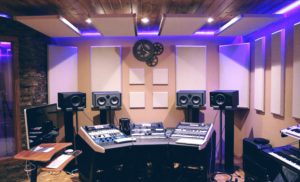There’s no doubt about it. COVID-19 has hit recording studios very hard over the last few months. And with the second wave of the virus hitting and countries across the globe going into lockdowns, these are worrying times indeed. Find out how recording studios are coping and what lies ahead…
The music industry has faced specific difficulties due to the Coronavirus. With concert dates being postponed, album release dates being cancelled, and recording studios being left in limbo.
Even before the pandemic started, studios faced challenges to stay open. With home recording setups becoming more prevalent, and with the increased studio rental prices imposed by landlords. Recording studio managers were already feeling the strain.
Thanks to lockdown restrictions and social distancing rules, life has become harder for studio managers. Schedules have had to be cleared and clients have had to be turned away. So the financial effects of COVID-19 has hit studios hard.

Support Is Needed
Representatives of the Music Producers Guild have called on Creative Industries Minister, Caroline Dinenage, for financial support. They have asked that some of the 1.57 billion financial aid that has been designated as emergency support for cultural business be made available to recording and rehearsal studios.
So far, the government has been very slow to provide support for this sector of the music industry, but it is desperately needed.
Who’s affected?
Some studios have already closed their doors. Piano Rooms in London is one business that has had to close. Unfortunately, so has the legendary Sawmill Studios in Cornwall. This historic Cornish building was once home to such bands as Oasis and Muse. But it is now being sold as a seven-bedroom detached house for £2.25 million.

More needs to be done to support recording studios before further closures are made.
Some have appealed for grants but have been turned down. These include Le Mob Studio in Hammersmith and Fulham and the famous Dean Street Studios in Soho. Not only has their appeal for a discretionary grant been rejected. But they have been turned down for business rates relief by local authorities too.
What’s being done?
The MPG’s letter has outlined the problem to the Creative Industries Minister. They have warned that 40% of recording studios face closure within 3 months if support isn’t made available.
Studios have had to pay full rent and business rates throughout the crisis, the letter states. But with government support, hundreds of businesses could be saved. The support given would also be a lifeline for musicians, engineers, and producers who are reliant on recording studios for their work.
The letter also supports the case that the reopening of recording studios can help the wider economy, and there is the promise that safety guidelines are now in place for work to continue.
A number of record label trade bodies have lent their support to the MPG’s request, including BPI and AIM. So it is hoped that the government will sit up and take notice. At a time when many other businesses have been offered grant support, it would be remiss of the government to ignore this vital sector of the music industry.
Should you work within the music industry, and especially if you’re a recording studio manager, it might be that you find a way to air your voice in support of the letter that has been sent by the MPG.

What Does The Future Hold?
Unfortunately, we don’t have access to a crystal ball or a time machine, so it is difficult to predict what the future holds.
At the moment, life for recording studio managers seems very bleak indeed. In a recent poll, it was found that 81% of people in the studio business had lost work because of the Coronavirus. We have already alluded to cases within the UK, but the effects of the pandemic have been felt worldwide.
In a recent article at Vice, one studio owner in the US discussed her worries about life after COVID. Holly Hansen, the owner of Salon, the first female-led studio in Minneapolis, said: I’m at the point where I don’t know if I should start thinking about closing. I have a month-to-month lease and I’m essentially paying most of the rent out of my pocket right now.”
The article highlights those who are able to work remotely during the crisis, but it also showcases those who have been unable to. These are the studios that have been left in limbo, alongside their clients who are keen to pursue their music dreams.
Going forward, the future seems uncertain, according to some of those interviewed at Vice. One expressed concern that artists might be unwilling to step back into a soundproofed room which has been sealed off with no windows. Using a microphone that others have used might also be an issue for artists according to one studio head. These are just some of the worries about life after COVID for managers, and it is likely that these concerns will be shared across the UK and internationally.

It’s Not All Doom And Gloom
Should you work as a recording studio manager, it’s important to face the future with optimism. Yes, life is difficult right now, but steps can be taken to remain open into the long-term.
For one, you can take steps to adhere to safety guidelines. One UK-based facility has highlighted what they are doing to keep people safe on their premises, so if you can follow their lead and led other know what you are doing, you can put the minds of your clients and employees at ease.
Now is also the time to market your business. With a concerted effort to promote what you can offer, you might attract more artists to your side. Broadening your services might also have a positive effect. Contact us to find out more about the services we can offer you, and benefit from the expert advice of our team of consultants.

Conclusion
By modifying your business in the wake of COVID and by promoting what you can offer, the future doesn’t have to be so bleak. The pandemic has hit recording studio owners hard. But with more marketing and (hopeful) financial assistance from the government, the future may be brighter than it seems!










